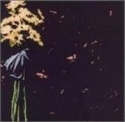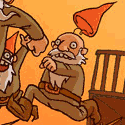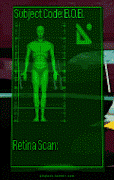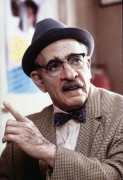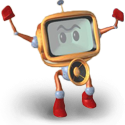|
Phummus posted:Here there be spoilers for the Night's Dawn Trilogy. Actually, your summary isn't entirely accurate. It's more like: It's more like this: Good guy is genetically lucky and/or psychic, which is mostly used to make him improbably able to survive and do anything in a mary-sue fashion. He also has sex with everything with two legs, but it's okay because he's so awesome everyone wants to do it. Bad guy is evil and so full of conviction that nothing is ever able to stop him, and he is improbably able to survive anything. Also he worships the devil, technically in a pseudo-church of satan 'liberating man from the shackles of religious rules' fashion, but which manifests mostly in lots of torturing of dudes and rape. Alien space magic somehow lets the dead possess the living, starting with satan worshiping dude. The returned dead also get a lot of magic abilities (in particular the ability to make technology stop working, conveniently) and torture people until they also get possessed by dead dudes, making it a weird space-zombie-pocalypse, since the possessed dudes possess more dudes in a nasty cycle. Al Capone becomes ruler of a couple planets, and he's paranoid that interplanetary G-men will figure out some way to reverse the possession thing. He somehow gets a credible naval force and a hot pop-star girlfriend. There are also magic bioships that can get possessed, and he gets a bunch of these. There are a bunch of other sub-plots, focusing on a space-habitat that gets possessed, space-children who don't get possessed but work with a guy who is half-possessed, and space-princess-turned-space-station-administrator woman (who totally has sex with the hero, lots of times and is hot). And a space-superweapon that has no actual importance to the plot whatsoever. But none of this matters because the hero finds a space-God who magically fixes all of the problems instantly. Then he marries the girl he knocked up. The end.
|
|
|
|

|
| # ? May 9, 2024 23:44 |
|
Hung Yuri posted:Like what? Hamilton is mostly my biggest foray into (the books anyways) space opera. For starters, this thread isn't "The Peter F. Hamilton" thread. Check out the other posts, people talk about a lot of great books. Personally, I like The Gap Cycle by Stephen R. Donaldson.
|
|
|
|
What's the general take on Gregory Benford's Galactic Centre stuff? I've read one of them out-of-order at the library one day, but it did't quite click on it's own - is it worth looking them up in proper order?
|
|
|
|
Adar posted:Unfortunately, David Feintuch (the Seafort writer) pulled a GRRM with a twist - he died while writing the last book in the series, and while the publisher has the manuscript they've never gotten anyone to sign a release. I just plowed through the first four of these, and by the end I wanted to do nothing but strangle the protagonist. I don't know if the departure from his narrative in the next book will make it any better, but I'm disinclined to read it. I liked what technobabble there was, and the way it drives (no pun intended) the plot was interesting. It's just...Seafort. He needs to get run over by one of the armored buses that tour lower Manhattan. Feintuch has taken all of Horatio Hornblower's recrimination, self-doubt and self-condemnation and crammed them twenty times over into a character incapable of controlling his emotions. Most of the books are him blowing up over something trivial at subordinates or feeling bad about it later before going on and doing the exact same thing.
|
|
|
|
Magnificent Quiver posted:Time travel ruins every book I've ever read that had it.
|
|
|
|
coyo7e posted:...To wound the autumnal city. The Door Into Summer as well. I liked it anyway.
|
|
|
|
Kerbtree posted:What's the general take on Gregory Benford's Galactic Centre stuff? I've read one of them out-of-order at the library one day, but it did't quite click on it's own - is it worth looking them up in proper order? Hell yeah man, this is one of the best sci-fi series you can read. It starts with In The Ocean Of Night and slowly picks up from there. It's done in groups of two, the first two in the near future of Earth. The last 4 are about 30000 years beyond that, the middle two being more action and the last being more science and philosphy with action:) Or thats my opinion anyway. The underlying theme is a collision between civilisations, one of flesh and one of machine, and the realisation that this conflict has existed for almost all of time and is drawing closer to a conclusion.
|
|
|
|
Tanith posted:I just plowed through the first four of these, and by the end I wanted to do nothing but strangle the protagonist. I don't know if the departure from his narrative in the next book will make it any better, but I'm disinclined to read it. I liked what technobabble there was, and the way it drives (no pun intended) the plot was interesting. Yeah the space-war aspects and naval codes/attitudes were great and made for interesting reading but the main character was a bit of a babby. I only read the first four also, does anyone think it's worth continuing?
|
|
|
|
coyo7e posted:...To wound the autumnal city. Trig Discipline posted:The Door Into Summer as well. I liked it anyway. I'll check these two out but I swear to god if they handwave away the paradoxes I'm going on a burning spree.
|
|
|
|
Trig Discipline posted:The Door Into Summer as well. I liked it anyway. Alexei Panshin posted:"The romantic situation in this story is a very interesting, very odd one: it is nothing less than a mutual sexual interest between an engineer of thirty and a girl of twelve ('adorable' is Heinlein's word for her), that culminates in marriage after some hop-scotching around in time to adjust their ages a bit."
|
|
|
|
fritz posted:Classic Heinlein. Although actually I think his best time travel story was probably the short story "By His Bootstraps". Come to think of it, The Stars My Destination by Bester was sort of a time travel book in a way, and I thought that was pretty good. Trig Discipline fucked around with this message at 00:41 on Aug 23, 2010 |
|
|
|
Even The Forever War features time travel, just not in the cheesy "go back in time and rob banks and kill peoples' parents" style. Stephen Baxters Xeelee stories have some time travel in them too, using wormholes and ships towing them around at relatavistic speeds for centuries. But I have to agree, most time travel stories suck.
|
|
|
|
Trig Discipline posted:Classic Heinlein. I got linked to some Heinlein drama on a few other sites recently and I just want to post two posts from a Heinlein forum (they were in different threads by different posters but) : quote:Poster 1 : The only good time travel story is All of an Instant but that's not space opera (also Back to the Future but that's not books, even its novelization)
|
|
|
|
fritz posted:I got linked to some Heinlein drama on a few other sites recently and I just want to post two posts from a Heinlein forum (they were in different threads by different posters but) : I honestly haven't read any Heinlein in probably fifteen years, but when I think back to his books I think "holy crap, that was a weird old dude". In fact I was joking about his weird incest/pedo tendencies in the Charles Stross thread just earlier today. I do remember liking The Door Into Summer anyway, though.
|
|
|
|
Trig Discipline posted:I honestly haven't read any Heinlein in probably fifteen years, but when I think back to his books I think "holy crap, that was a weird old dude". In fact I was joking about his weird incest/pedo tendencies in the Charles Stross thread just earlier today. I do remember liking The Door Into Summer anyway, though. His young adult books are his best material, probably precisely because he ignores his bizarre theories on marriage and sexuality to better cover the action and some light and silly political stuff. Space Cadet, Citizen of the Galaxy, maybe Farmer/Tunnel in the Sky, etc. They're dated and not a little sexist, but they remain fun to read once you break through the 50's-era stylistic background.
|
|
|
|
ThaGhettoJew posted:His young adult books are his best material, probably precisely because he ignores his bizarre theories on marriage and sexuality to better cover the action and some light and silly political stuff. Space Cadet, Citizen of the Galaxy, maybe Farmer/Tunnel in the Sky, etc. They're dated and not a little sexist, but they remain fun to read once you break through the 50's-era stylistic background. Podkayne of Mars: wikipedia posted:The book is a first-person narrative in the form of Podkayne's diaries. Due to the unscheduled "uncorking" (birth) of their three test-tube babies, Podkayne's parents cancel a much-anticipated trip to Earth. Disappointed, Podkayne confesses her misery to her uncle, Senator Tom Fries, an elder statesman of the Mars government. The mistake proves to have a silver lining. Fries pressures creche officials into paying for an upgraded passage on a luxury liner for Podkayne (about 17 Earth years old) and her asocial genius brother Clark (about 11), with Fries acting as chaperone.
|
|
|
|
fritz posted:Podkayne of Mars: If I'm reading that description right Tom wasn't blaming the parents for being injured by the bomb (that he planted), but for the younger brother being a jackass and possibly for the kids being with him on his dangerous mission at all instead of with the parents. I didn't read it, but I think Podkayne was him sort of explicitly moving away from his other "juveniles". Still not nearly as creepy as the incest/polygamy/rapetime/whatever that he gets up to with his mature titles.
|
|
|
|
ThaGhettoJew posted:His young adult books are his best material, probably precisely because he ignores his bizarre theories on marriage and sexuality to better cover the action and some light and silly political stuff. Space Cadet, Citizen of the Galaxy, maybe Farmer/Tunnel in the Sky, etc. They're dated and not a little sexist, but they remain fun to read once you break through the 50's-era stylistic background. Oh I know, when I was a teenager I read everything he ever wrote. Became largely disenchanted with him later on both for his politics and for some of the things being discussed here. I thing when I was younger I just looked past a lot of the perverted old-man-loving because I was more interested in rockets and time travel.
|
|
|
|
fritz posted:The only good time travel story is All of an Instant but that's not space opera I don't know if I'd go so far as to say this is the only good time travel book, but it is really, really awesome and a unique take on the idea. For a space opera with decent time travel (although it really isn't a focal point of the plot until near the end, just an explanation for how space travel works) check out Roger MacBride Allen's Chronicles of Solace trilogy: space travel is done by flying out to the middle of nowhere for 50+ years (while the crew is in cryogenic suspension) to 'wormhole farms' where you drop through one, end up 100+ years back in time, then spend ~50 more years flying back to wherever you're going. It creates interesting scenarios such as 'Time Patrol' ships that hang out around these wormhole farms and make sure that the arriving ships don't communicate with anyone and alter the timeline by sharing future knowledge.
|
|
|
|
Midget Fist posted:Even The Forever War features time travel, just not in the cheesy "go back in time and rob banks and kill peoples' parents" style. Some of Robert L. Forward's work has time travel stuff in it in a vein similar to Baxter's stuff - Timemaster basically has the same "tow wormholes around at relativistic speed" stuff (although his wormhole are more interesting, being made out of beings of sentient negative matter) and Dragon's Egg has stuff about the effects of beings living on the surface of neutron stars.
|
|
|
|
I haven't read a proper Sci Fi novel before (I've always been more of a fantasy person) but I've been playing Mass Effect 2 recently and I'd love to a novel/series that's similar in scale to Lord of the Rings/asoiaf or something but set in space. I like Battlestar Galactica/Firefly etc, so something along a similar vibe to that in book form would be awesome.  Can any one recommend something? Thanks. Can any one recommend something? Thanks. 
|
|
|
|
I really liked Dan Simmons's Hyperion. I did not like the series after the first book because I think he ruined it halfway through Fall of Hyperion, but I enjoyed the first so much I bought Ilium to see if he could perform the same sort of magic and beautiful prose. Well, Ilium was good. Nothing amazing, but I loved the characters (especially Mahnmut and Orpho of Io) and could tell it was an earnest examination into the role of knowing our past in who we are (cleverly, with three sets of protagonists: one with no cultural history, one with no memories of his past, and one who is not human, but knows more about human culture than the other two). Ilium definitely didn't have the compelling tragedy and dread that Hyperion had, but it was funny and cool and interesting. Up next is Olympos, the sequel. I'm hoping beyond all hope that Simmons doesn't ruin this series as well, but I know it may happen.
|
|
|
|
Mike the TV posted:Up next is Olympos, the sequel. I'm hoping beyond all hope that Simmons doesn't ruin this series as well, but I know it may happen. Not only does he ruin it, he apparently learned his lesson from the Hyperion series and figured out how to ruin a series twice as fast.
|
|
|
|
Mike the TV posted:I really liked Dan Simmons's Hyperion. I did not like the series after the first book because I think he ruined it halfway through Fall of Hyperion, but I enjoyed the first so much I bought Ilium to see if he could perform the same sort of magic and beautiful prose. Did you mess around with Endymion and Rise of Endymion? Space Catholicism as a concept, and Space Priest and Co. as characters are awesome, and the rest of the books are terrible. On the topic of ruining series: Evolutionary Void tomorrow!
|
|
|
|
Magnificent Quiver posted:Not only does he ruin it, he apparently learned his lesson from the Hyperion series and figured out how to ruin a series twice as fast. Aww man. I'll read it anyway, unless it starts to really piss me off. But I got really drat pissed about HUMAN GOD VS ROBOT GOD and SPACE JESUS in Hyperion. I guess if it's ruined twice as fast, it'll be in the first quarter of Olympos and I'll know early on to quit! Tanith posted:Did you mess around with Endymion and Rise of Endymion? Space Catholicism as a concept, and Space Priest and Co. as characters are awesome, and the rest of the books are terrible. No I decided that the series was dead to me after Fall of Hyperion. I don't hate Fall, because it did have some cool stuff, but man did it disappoint in the last half. It's like Simmons just gave up! I figured there was pretty much nowhere interesting left to go besides mystical fantasy-land, and the descriptions of Endymion didn't impress me (and the cover art wasn't good enough for me to ignore everything else).
|
|
|
|
Mike the TV posted:Up next is Olympos, the sequel. I'm hoping beyond all hope that Simmons doesn't ruin this series as well, but I know it may happen. Ha ha ha ha ha ha Anyway, Peter F. Hamilton's final book in the Void trilogy comes out tommorow. What does everyone think of this compared to his other stuff? I enjoy the chapters set in the commonwealth, but the fantsy-ish stuff takes up too much of the book.
|
|
|
|
Chairman Capone posted:Some of Robert L. Forward's work has time travel stuff in it in a vein similar to Baxter's stuff - Timemaster basically has the same "tow wormholes around at relativistic speed" stuff (although his wormhole are more interesting, being made out of beings of sentient negative matter) and Dragon's Egg has stuff about the effects of beings living on the surface of neutron stars. I've had Dragon's Egg on my reading list for a while but have yet to stumble across it in a second-hand bookshop:(
|
|
|
|
Midget Fist posted:I've had Dragon's Egg on my reading list for a while but have yet to stumble across it in a second-hand bookshop:( It's not really time travel (except in the 'beings who evolved on a neutron star would live waaaay faster than us' sense) but it's a really good read. Basically you follow this alien civilization as they go from worshipping the new lights in the sky (us) to a more-advanced-than-us technological civilization over the course of a month or so.
|
|
|
|
Yeah, I was being kind of loose with my definition of time travel to basically just mean "time going strangely" (although I did think that at one point the neutron star beings developed time travel but I guess not) but it's a really good book regardless. It's interesting to note that it began as a collaboration with Larry Niven because it's really not like anything of Niven's that I've ever read.
|
|
|
|
WarLocke posted:It's not really time travel (except in the 'beings who evolved on a neutron star would live waaaay faster than us' sense) but it's a really good read. Basically you follow this alien civilization as they go from worshipping the new lights in the sky (us) to a more-advanced-than-us technological civilization over the course of a month or so. That sounds a little like an early theme of Niven/Pournelle's "The Mote in God's Eye". The aliens in that one live and think much faster than humans, and they appear moderately behind us in most ways upon first contact. It's closer to hard S.F. than space opera, but there's fleets of ships and alien terrors and just a touch of romance so it might as well be in this thread. The sequel's not bad either ("The Gripping Hand"). edit: beat, in a way.
|
|
|
|
Tanith posted:I just plowed through the first four of these, and by the end I wanted to do nothing but strangle the protagonist. I don't know if the departure from his narrative in the next book will make it any better, but I'm disinclined to read it. I liked what technobabble there was, and the way it drives (no pun intended) the plot was interesting. Midget Fist posted:Yeah the space-war aspects and naval codes/attitudes were great and made for interesting reading but the main character was a bit of a babby. I only read the first four also, does anyone think it's worth continuing? The fifth one isn't even from Seafort's POV. The sixth is, the seventh isn't. The new characters also have the same issues, but most of them are teenagers from whom the angst is more reasonable. I'd say they're worth reading.
|
|
|
|
Ego-bot posted:Ha ha ha ha ha ha I actually really liked the fantasy-ish stuff. And I'm loving buried in books and yeah, Evo Void is out tomorrow. And I'm getting it. he'll have to finish his next series before I buy another book though.
|
|
|
|
I read The Dreaming Void when it came out, and bought, but haven't read the Temporal Void. I've been waiting until all the books are out so I can mainline them. I'm re-reading TDV right now, and there's no way I could have remembered half of the stuff that went on in this book. I remember being somewhat disappointed in the book originally, but I'm enjoying the re-read. I can only hope that the second and third books tone down the 'Araminta in the City' parts.
|
|
|
|
I picked up Evolutionary on e-book, and I'm skimming through the dreams a bit before settling in for the whole thing. The Edeard stuff gets a lot more grim this time, and I think it's pretty interesting where it goes. Main plotline is also pretty good. The main question I have is how much of a ending-out-of-nowhere it's going to have. Guess I get to find out in a few days!
|
|
|
|
Midget Fist posted:I've had Dragon's Egg on my reading list for a while but have yet to stumble across it in a second-hand bookshop:( It's not a particularly well-crafted book but it's amazing if you're 12 or so. ("golden age of science fiction is" ec etc)
|
|
|
|
Hamilton continues to slowly improve. There is hope for the future. That is all. (Of course the ending doesn't make sense, but it's no Fallen Dragon or Night's Dawn poo poo.)
|
|
|
|
Can anyone give me a run down on Alastair Reynolds' novels? I keep seeing them at my local(ish) Waterstones, specifically the Revelation Space novel/timeline? They look and sound interesting but I'm a bit hesitant to pick them up on the fly. That said though I have a stupid amount of books backlogged I need to get through and I am just adding to the list, but Reynolds is apparently Welsh and that does tip the balance in his favour to me.
|
|
|
|
Flipswitch posted:Can anyone give me a run down on Alastair Reynolds' novels? I keep seeing them at my local(ish) Waterstones, specifically the Revelation Space novel/timeline? They look and sound interesting but I'm a bit hesitant to pick them up on the fly. I've only read the first two, but I definitely recommend them. Well, try the first one out anyway. It works well as it's own thing, and I really like the universe Reynolds sets up. I can't really recommend Chasm City as much. It starts out fairly compelling, but Reynolds loses track of what the point is. The "mystery" in the book becomes extremely obvious before it's revealed in earnest to the reader and protagonist, but I still had fun confirming that I had been correct for the last 300 or so pages. It has a weird B-plot that doesn't really get resolved within the book, but we are promised that it will be all wrapped up in the next exciting adventure! Also, there is one character that ruins the whole thing for me because she does. absolutely. nothing.* *Except be a ditsy genetically engineered furry. Mike the TV fucked around with this message at 18:22 on Aug 25, 2010 |
|
|
|
Flipswitch posted:Can anyone give me a run down on Alastair Reynolds' novels? I keep seeing them at my local(ish) Waterstones, specifically the Revelation Space novel/timeline? They look and sound interesting but I'm a bit hesitant to pick them up on the fly. Revelation Space is good, somewhat hard sci-fi space opera. The central plotline is all about Fermi's Paradox, in particular why there's no sign of intelligent life in the galaxy, and it's pretty neat. The sequel, Redemption Ark, is still pretty good, but it starts to get pretty wacky. The final book, Absolution Gap is pretty much totally bizarre and I hated the ending. The spinoff books include Chasm City (which is a space opera/noir mystery), which I found better than any of the main-series books, and The Prefect, which is also pretty good. I would say you probably should read Revelation Space, then Redemption Ark, then the spinoffs, and maybe read Absolution Gap after that if you want. Don't read the spinoffs after Absolution, though, unless you can't avoid it. Century Rain is also a weird sci-fi/noir mystery hybrid, and it's also pretty enjoyable.
|
|
|
|

|
| # ? May 9, 2024 23:44 |
|
Mike the TV posted:I've only read the first two, but I definitely recommend them. Well, try the first one out anyway. It works well as it's own thing, and I really like the universe Reynolds sets up. Thanks, I'll definitely give the first one a go when I get chance to pick up a copy (which would be now if I wasn't enjoyably struggling my way through The Brothers Karamazov) and I'll give Chasm City a shot regardless as there are other novels some people have disliked that I tend to have a soft-spot for anyway so it's worth a shot. I think I'm afraid to ask about the last bit of your post though. Velius posted:Revelation Space is good, somewhat hard sci-fi space opera. The central plotline is all about Fermi's Paradox, in particular why there's no sign of intelligent life in the galaxy, and it's pretty neat. The sequel, Redemption Ark, is still pretty good, but it starts to get pretty wacky. The final book, Absolution Gap is pretty much totally bizarre and I hated the ending.
|
|
|




